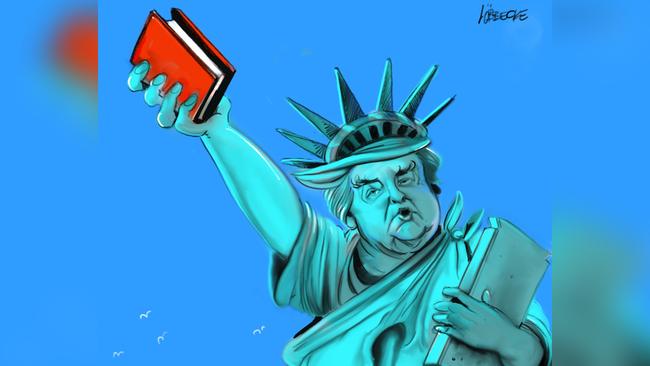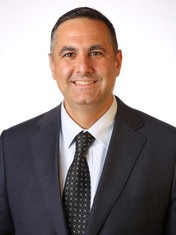
A US academic published a little red book this month. Yawn. It’s about Donald Trump, populism and the threat of the new authoritarianism to our liberal democratic order. Cue eye roll.
Wait a second. This American academic says Trump is not a danger to democracy. In fact, social scientist Salvatore Babones suggests the populist US president is the unlikely hero who may help mend what is wrong with modern democracy.
It gets better. Babones teaches within the arts and social sciences faculty of the University of Sydney. And his book, The New Authoritarianism — Trump, Populism and the Tyranny of Experts is just what his academic colleagues should read.
Here is an overdue and rational corrective about populism and authoritarianism that challenges the Trump hatred so common among many Sydney University academics. For them, Trump-loathing is a default setting, along with loathing former prime minister Tony Abbott, which explains their frenzied opposition to a degree funded by the Ramsay Centre for Western Civilisation.
Babones publicly questions some of the nutty objections to the Ramsay offer and is becoming quite the campus iconoclast. The author and co-author of seven books and dozens of academic articles jotted down notes for his latest book while watching Trump’s inauguration. The result is a standout from what The New Yorker calls the growing “library of anxiety” about Trumpism.

While others drew crazy comparisons between Trump’s speech and Hitler’s Nuremberg rallies, Babones heard echoes of American populism. Whereas others described Trump’s populism as toxic, Babones mulled over the reality that “most ordinary Americans fail to see any inherent evil in the idea of an American president putting America first”.
Babones debunks the growing hysteria that Trump is an authoritarian threat to democracy. Given that “authoritarian” means a system of governance that demands deference to authority, the author asks those who call Trump an authoritarian to answer a simple question: “To what authority does Donald Trump defer?” Franco’s Spain demanded obedience to church, monarchy and military. Hitler and Stalin drew authority from their totalitarian political parties. Vladimir Putin’s authority rests on Russia’s security apparatus with a nod to the Orthodox Church. “The common thread (of authoritarianism) … is that people should not think for themselves,” writes Babones.
Trump asked people to put faith in him, and him alone. He is a narcissist, to be sure. He is also a populist, says Babones, not unlike that early populist US president Andrew Jackson (1829-1837) who portrayed himself as a man of the people, attracted crowds at his inauguration that really were the largest ever recorded, rode his white horse to the White House, and made policy calls that endeared him to regular voters and enraged elites.
“Jacksonian Democracy” has become a byword for “government controlled by the people” — the same words Trump used at his inauguration.
Trump’s election hasn’t challenged the US courts, stymied congressional oversight or stopped the presses. All are still open for business. Some might say business is booming for those entrusted to check and balance presidential power.
Babones’ central thesis is that 21st century authoritarianism is not about Trump, it’s not even right-wing or nationalist or even conservative. The real threat to democracy comes from a form of liberal authoritarianism. “It is the tyranny of experts,” he writes.
His diagnosis of what ails modern US democracy is a warning shot for us. He starts with Abraham Lincoln’s Gettysburg Address: government “of the people, by the people, for the people”.
Babones interprets the celebrated three-part phrase to mean that all three political traditions must be in balance, in healthy tension. “Of the people” implies a classically conservative view of the people as a single society, not a collection of individuals and special interests; “by the people” evokes the historically liberal program of extending equal rights to all; and “for the people” alludes to devising programs for the people, the core of the progressive agenda.
Babones presents a sobering account of how the liberal part of the equation has thrown democracy out of kilter. “Political liberalism,” he writes, “has evolved over nearly three centuries from a philosophy of safeguarding freedoms into a philosophy of demanding rights.” He contrasts the First Amendment in the US Constitution, which records freedom of assembly, religion, speech and the press for Americans with Article 25 of the UN Declaration of Human Rights, which purports to grant myriad new rights to food, clothing, housing and so on.
This evolution from reserving freedoms to creating rights happened for sound reasons, but it begs a series of pertinent questions. Who gets to create rights? For whom are they created? How are new rights to be applied and interpreted? The new liberal project draws on a growing army of unelected experts to decide these matters.
Babones says that while conservatives and progressives slug it out at elections across the Anglosphere, liberals don’t need to win elections to hold real power. Their political aims are implemented by a growing cadre of educated professionals, from academics, lawyers and judges to civil servants, social workers, doctors and lobbyists, in an expanding state with increasingly complex laws and regulations.
Drawing on experts is understandable. If you need brain surgery, you ask for brain surgeon. But politics is a unique field of human activity, says Babones. It draws on the consent from the people for its legitimacy.
Yet, from education curriculums set by bureaucrats and university policies that infringe on free speech to unlegislated climate change agreements to trade agreements drawn up behind closed doors, large swathes of public policy are influenced by unelected experts aligned with a new form of liberalism.
While others can debate whether this shift leads to good outcomes for people, Babones’s central point is harder to dispute: the transfer of power to a new and growing class of “liberal” experts entrusted to create and implement new rights is inherently undemocratic. Groomed for loyalty, this self-selecting expert class speaks with one voice. Ordinary people are discouraged from thinking for themselves.
Here, says Babones, is the new authoritarianism.
“The greatest spiritual danger facing 21st century democracy is that liberal intellectuals increasingly dismiss the moral right of less-educated people to have opinions that conflict with the consensus wisdom of the expert class,” he writes.
And populism is the last-gasp strategy to up-end this liberal authoritarianism. Populism forces lofty-minded experts to engage seriously with the mundane views of ordinary citizens. Brits caught the attention of experts with their decision to leave the EU, though the Remainers are trying desperately to quell the democratic Brexit rebellion. If the experts succeed, the new liberal authoritarianism will have rendered British democracy impotent.
Now for the truly scandalous conclusion to this little red book: Trump may be democracy’s saviour in this epic tale. His election remains the first serious challenge to a growing global consensus among “experts” on everything from immigration to trade and climate change. The least humble of politicians paid the most attention to ordinary people. And that explains election day 2016 when, as Babones writes: “(Hillary) Clinton’s basket of ‘deplorables’ looked the country’s liberals dead in the eye and said, ‘you’re fired’.”
janeta@bigpond.net.au



